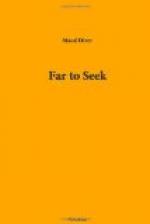Roy watched him savouring the chicken and peas; discussing the decay of falling in love, its reasons and remedies; and thought, for the hundredth time, what a splendid old boy he was; so big and breezy, nothing bookish or newspapery about him. Quite a masterpiece of modelling, on Nature’s part; the breadth and bulk of him; the massive head, with its thatch of tawny-grey hair that retreated up the sides of his forehead, making corners; the nose, rugged and full of character; the beard and the sea-blue eyes that gave him the sailor aspect Roy had so loved in nursery days. Now he appraised it consciously, with the artist’s eye. A vigorous bust of his godfather was his acknowledged masterpiece, so far, in the modelling line, which he preferred to brush or pencil. But first and foremost, literature claimed him: poetry, essays, and the despised novel—truest and most plastic medium for interpreting man to man and race to race: the most entirely obvious medium, thought Roy, for promoting the cause he had at heart.
Though his brain was overflowing with the one subject, he was reserving it diplomatically for the more intimate atmosphere of port wine, coffee and cigars. Meantime they always had plenty to talk about, these two. Broome held the unorthodox view that he probably had quite as much to learn from the young as they from him; and at the moment, the question whether Roy should take up literature in earnest was very much to the fore.
Once or twice during a pause, he caught the shrewd blue eye watching him from under shaggy brows; but each kept his own counsel till the scout had removed all superfluities. Then Broome chose a cigar, sniffed it, and beheaded it.
“My particular weakness!” he remarked pensively, while Roy filled his glass. “What an attentive godson it is! And after this intriguing prelude—what of the main plot? India?”
Under a glance as direct as the question Roy reddened furiously. The ‘dear old boy’ had done more than suspect; he had seen through the whole show—the indignity of all others that youth can least abide.
At sight of his crestfallen countenance, Broome laughed outright. “Bear up, old man! Don’t grudge me a fraction of the wits I live by. Weren’t you trying to give me an inkling yesterday?”
Roy nodded, mollified a little. But his self-confidence wilted under the false start. “How about arm-chairs?” he remarked tentatively, very much engaged with a cigarette.
They removed their coffee-cups, and sipped once or twice in silence. “I’m waiting,” said Broome, encouragement in his tone.
But Roy still hesitated. “You see——” he temporised, “I’m so fearfully keen, I feel shy of gassing about it. Might seem to you mere soppy sentiment.”
Broome’s sailor eyes twinkled. “You pay me the compliment, my son, of treating me as if I were a fellow-undergrad! It’s only the ’teens and the twenties of this very new century that are so mortally afraid of sentiment—the main factor in human happiness. If you had not a strong sentiment for India, you would be unworthy of your mother. You want to go out there—is that the rub?”




